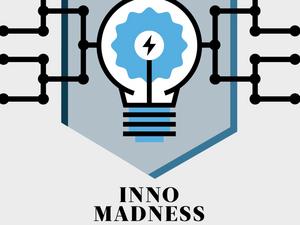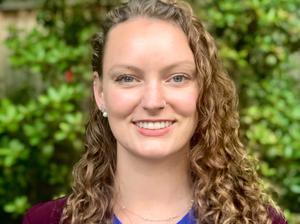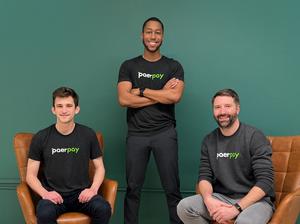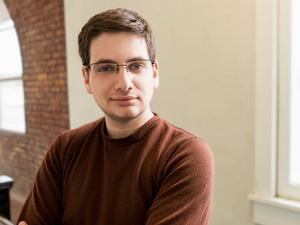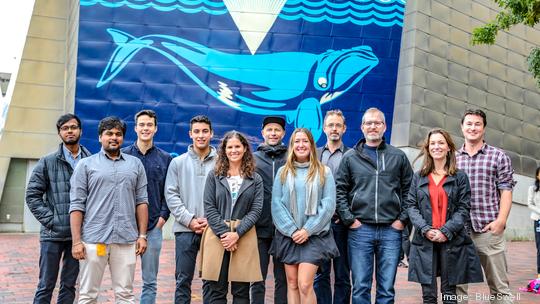
On a recent evening at the New England Aquarium, seven teams celebrated the end of their time in the BlueSwell incubator by pitching plans for their business’ futures.
The incubator was created by SeaAhead Inc. and the New England Aquarium in 2020 to bring bluetech innovations out of the lab and onto a path toward commercialization. The founders in this year’s cohort spent the last six months working with scientists from the New England Aquarium, venture capitalists and business strategists from SeaAhead to advance their startups.
The startups have varying areas of focus, including ocean health, sustainable fishing and renewable energy. And each startup has different goals for the year ahead, from raising seed rounds to finding new clients.
Meet the companies from this year’s BlueSwell incubator.
Aristotle’s Lantern: Husband and wife Wes and Kate Newbury started Aristotle’s Lantern to curb the rapid spread of sea urchins and subsequent destruction of kelp forests in California and New England. The co-founders developed a process by which urchins are collected by divers and transferred to the company’s ocean ranch.
This environmental solution also has a financial benefit. The urchins are fed a proprietary feedstock and sold for the uni, or edible meat, inside the urchins. Wes said premium uni from Santa Barbara retails for over $320 a pound.
“After two years of operating, we’ll transition from leasing lines (for ranching) to owning 25 of our own,” Wes said. “By year five, we’ll establish an uni processing facility in Los Angeles. This will enable us to evolve from a conventional ranching model to a business that sells technology and purchases ranched urchins.”
Aristotle’s Lantern is in the process of raising funds.
Can I Recycle This?: This startup is on a mission to keep recyclables out of landfills, the environment and the ocean. Co-founder Katherine Shayne and her team have created a technology platform that tells companies and consumers location-specific information about how and where to recycle materials. Shayne said the startup is partnering with companies like airlines to make sure the products they buy are accepted at each destination. Each state typically has different requirements for what can and cannot be recycled.
“The market is right for an innovation like this. Not only are brands and large airlines in this space, but also the banking industry, the co-working industry,” Shayne said. “Think about all the spaces out there that have multiple branches in different locations. And most business needs are already met by software. Why not sustainability?”
Can I Recycle This? is looking for partnerships in different industries, including retail, banking and hospitality.
Oceanic Labs: This startup is creating a family of undersea tools to monitor the chemical and biological environment of the ocean. Its products are designed to be mass-produced, commoditized and disposable, said founder Allan Adams. The team behind Oceanic is a group of researchers from MIT and Woods Hole Oceanographic Institution focused on marine instrumentation.
“Our goal isn’t to tell you that there’s nitrate on your waterfront. Our goal is to tell you that at 2 a.m. on Tuesday night, there’s a bunch of nitrate coming off the 14th tee of that golf course,” Adams said. “And that is actionable.”
Sign up for The Beat, BostInno’s free daily innovation newsletter from BostInno reporter Hannah Green.
Ithaca Clean Energy: This company’s engagement app, Waterfront, is facilitating communication and data sharing between offshore wind farms and fishing communities. Founder Khalid Kamhawi said the app is already in use off the coast of Massachusetts with Vineyard Wind. Offshore wind companies can share information with fishing communities about the locations of wind turbines and planned activities, like repairs, at the sites. Local communities can log their fishing locations, ecological information and marine hazards.
“Communication and data exchange is the missing piece of the puzzle for the deployment of offshore wind in the U.S.,” Kamhawi said. “If any of you want to help us turn the ocean into a solution for climate change, please get in touch.”
Mabel Systems: Founded by Gavin Andrews, this company is making camera-based inventory systems for seafood processors. Andrews said that poor inventory management leads to food waste and prevents full traceability for seafood. The company is focusing its technology on small businesses, which Andrews said account for 80% of seafood processors worldwide.
“The product that we just launched is really just for phase one. This is the analog to digital transformation,” Andrews said. “But we see this can be a platform to add new, additional technology to automate the data capture, and cameras and sensors that we’ve already developed to automatically capture this data and analyze it.”
The company has locked down two customers since launching and is looking to bring more small businesses onto its platform.
Organicin Scientific: This company is developing drugs to kill diseases in seafood without harming the animal and without increasing antibiotic resistance and toxicity. Organicin’s product is a protein that safely and effectively eradicates pathogens, said CEO Griffin O'Driscoll. The company is focusing on oysters and working with wholesalers.
“Bacteria have evolved numerous mechanisms to kill their competition over billions of years. Nature has already given us the keys to the kingdom, so why reinvent the wheel?” O'Driscoll said. “Our proprietary screening methodology overcomes this barrier of discovery by knowing exactly where to look for these keys. Best of all, it works for all bacteria.”
Organicin is raising its pre-seed round to bring its technology from the petri dish to animal studies, O'Driscoll said. The company is also looking to work with feed manufacturers, animal health nutrition companies and pharmaceutical companies.
USEFULL: Founder Alison Rogers said her company is trying to eliminate single-use food and beverage products. USEFULL has created an app and an inventory of stainless steel to-go cups, bowls and containers, which it has rolled out at places like Mount Holyoke College and Carlton College. Students pick up a food order in a reusable container and then return the container later, and the app manages the process.
“We’re not a dish-washing company. We’re not a logistics company," Rogers said. "We’re really helping our clients by supplying the technology and the inventory to get started."
USEFULL recently raised a $1.7 million round to scale with other universities and is looking for new partners and new employees.
